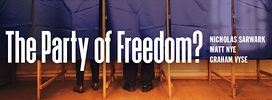Partisan affiliation has long been a widely debated question in the libertarian movement. For advocates of “individual liberty, limited government, free markets and peace,” which party offers the best prospects for advancing libertarian values and issue positions? This is a difficult question for an ideological camp that is, by most people’s reckoning, a distinctly minority persuasion in American politics.
Founded in 1971, the Libertarian Party offers one possible approach. America’s third-largest political party, the Libertarian Party is often the most visible advocate of libertarianism in each quadrennial presidential election, as well as running hundreds of candidates for state, local, and congressional offices.
Despite the appeal of a distinctly libertarian political party, the Libertarian Party has struggled to find electoral success within a two-party system. Over the years, the party has had a few state legislators, and a greater number of local officeholders, but it has never elected a member to statewide or federal office. The party’s peak result in the presidential election came with the 2016 ticket of Gov. Gary Johnson of New Mexico and Gov. Bill Weld of Massachusetts, who received 3.3% of the national popular vote, or just under 4.5 million votes.
Another position advocated by many libertarians has been to work within the Republican Party, a view espoused by the Republican Liberty Caucus (RLC) since its founding in 1991. The RLC points to the successes of politicians like former Rep. Ron Paul (R-TX), his son Sen. Rand Paul (R-KY), and Rep. Thomas Massie (R-KY). Building on the fusionist tradition of libertarian-conservative alliance in American politics, the RLC views third-party efforts with skepticism and holds that within a two-party system, libertarians can best find their voice and exercise the greatest amount of public-policy influence as Republicans.
At the other end of the spectrum, there have been efforts to urge libertarians to instead work within the Democratic Party, and to pursue areas of agreement there on topics such as civil liberties, foreign policy, and social issues. This perspective found advocates during the later years of the George W. Bush administration, and has again found some purchase among libertarians in the era of President Trump. With third-party efforts seen by many as futile, and a Republican Party increasingly hostile to many libertarian principles, is there ground for a new kind of fusionism to the left? Should libertarians rally around liberalism in the broadest sense, and make common cause with Democrats in opposition to Trump-style conservative populism?
Those are the questions to be addressed in this issue of Cato Unbound. Speaking for the Libertarian Party is Nicholas Sarwark, who has served as chairman of the party’s national committee since 2014. Matt Nye, chairman of the Republican Liberty Caucus, will offer his perspective on why libertarians have a home in the GOP. Finally, we’ll hear from Graham Vyse, a journalist in Washington, D.C., who writes about media, politics, and polarization and whose has appeared in The Washington Post Magazine, The New Republic, The Washington Monthly, and Washingtonian, among others.
We are looking forward to the discussion!
Andy Craig
Guest Editor, Cato Unbound
Jason Kuznicki
Editor, Cato Unbound

